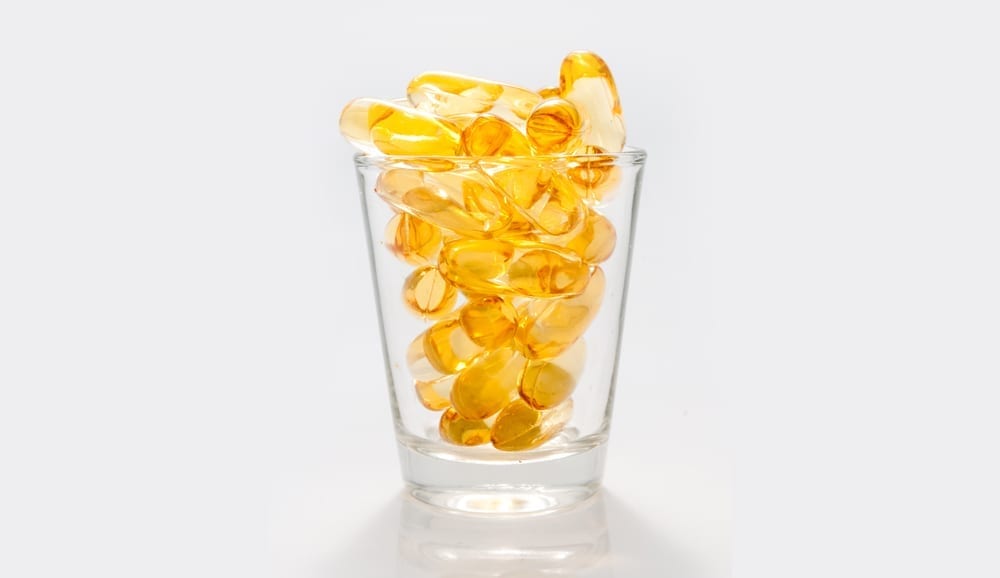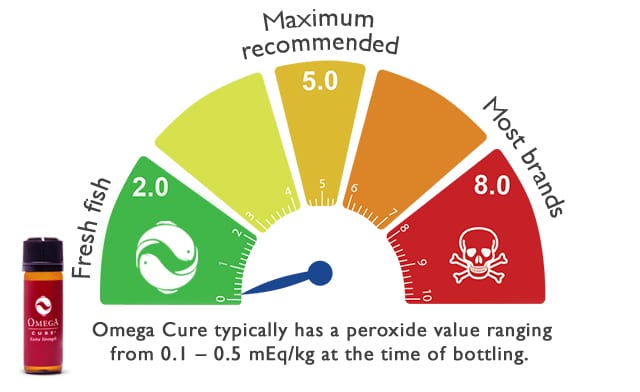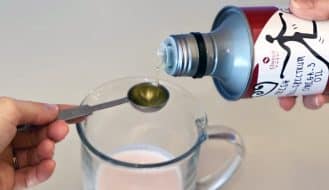Is Rancid Fish Oil Safe to Consume?
Think about fish oil. If your gut reaction is “yuck,” you are in good company.
Whether it’s from remembering Grandma’s cod liver oil or taking those horse-pills in the cupboard, most people believe that fish oil ought to taste bad. We put up with the unpleasant fish oil smell and taste because, well, it’s hard to argue with the benefits substantiated in thousands of research studies.
But the truth is that high quality omega-3 products shouldn’t taste like yesteryear’s salmon. If your current fish oil capsules smell fishy – or give you nauseating burps throughout day – you most likely have a rancid product on your hands.
Why Does Fish Oil Go Bad So Quickly?
As seafood lovers know, fish spoils more easily than other foods if not kept cold or consumed quickly. The same goes for fish oil.
The reason fish and fish oil spoil quickly is that they are rich sources of polyunsaturated omega-3 fatty acids. Known for their anti-inflammatory benefits, omega-3s are characterized by their large numbers of reactive double bonds. While this chemical structure makes the omega-3s extremely flexible and responsive in the cell, the same trait also explains why these fatty acids are so vulnerable to the effects of oxygen.
As fish oil oxidizes, new byproducts begin to form in the oil called lipid peroxides, as well as harmful aldehydes and ketones. These oxidation byproducts are what gives off the unpleasant smell and taste of spoiled fish.
The rate at which the omega-3 molecules oxidize depends on a number of factors, including how the fish were harvested and the oil processed. But once an oil has started to oxidize, there is no going back. At that point, it’s simply a matter of time before the oil goes rancid and counteracts the benefits of omega-3 fish oil.
Any foods or supplements rich in omega-3s are vulnerable to spoiling quickly.
Rancid Fish Oil Effects Are Cause for Concern
Aside from tasting and smelling bad, rancid fish oil is less effective than fresh fish oil. Because oxidized omega-3 molecules have a different chemical shape and reactivity than their unoxidized fatty acid counterparts, they’re not able to carry out the same functions in the cell.
Can Rancid Fish Oil Make You Sick?
Many scientists also believe that consuming rancid fish oil may be harmful. At least two comparative studies to date show that consuming rancid fish oil can increase bad cholesterol levels. And in animal studies, oxidized fatty acids have been found to cause organ damage, inflammation, and atherosclerosis, among other problems.
This is why it’s critical to consider the freshness level of your omega-3 supplement, whether it’s made from fish oil, krill oil or algae.
Unfortunately, independent studies from Canada, New Zealand, Norway, South Africa, and more have discovered that the majority of over-the-counter omega-3 supplements exceed acceptable oxidation limits, long before the products’ supposed expiration dates.
How to Combat Rancidity in 5 Easy Steps
While rancid fish oil is unfortunately all too common, fresh fish oil can provide consumers with a relatively inexpensive, safe way to improve health. Some of the most commonly cited benefits of getting enough omega-3s includes: lowering triglyceride levels and blood pressure, improving joint discomfort and mobility, and improving focus and mental health.
To ensure optimal benefits, seek out a high quality fish oil product by doing the following:
Step 1: Evaluate Your Current Product
When assessing fish oil, put all products through the taste and smell test. Truly fresh fish oil has no fishy taste or smell, just like fresh fish.
To tell if your fish oil capsules are rancid, break them open. If your nose catches a pungent smell, it’s time to throw your capsules away.
Liquid omega-3 supplements also go bad with time and exposure to oxygen. So if your liquid fish oil or cod liver oil smells and tastes bad, get something else.
Rancidity is something you can taste and smell. In this video, a tasting panel compares Omega Cure® with a krill oil, prenatal omega-3 supplement, and fish oil capsule. See how they do and try it yourself at home!
Step 2: Make Smart Purchases
Fish oil is a food substance that’s highly perishable, just like milk or seafood. To a certain degree, it can be stabilized, but beware of labels that have two- or three-year expiration dates.
You wouldn’t eat two-year-old salmon stored at room temperature, would you? If your product has been sitting on the shelf for years, it’s almost certainly rancid.
Step 3: Check Your Fish Oil’s Oxidation Values
How oxidized an omega-3 product is can be measured by looking at its oxidation values, better known as the peroxide, anisidine, and TOTOX levels.
The peroxide value indicates the amount of lipid peroxides that have formed in the oil, while the anisidine values measures the levels of secondary oxidation byproducts, like aldehydes. The TOTOX value, which is calculated based on the peroxide and anisidine values, provides a more complete picture of the freshness level of the oil.
Typically, the lower the peroxide, anisidine, and TOTOX numbers are, the fresher the oil. You can learn more about how to interpret these numbers here.
Though these measurements aren’t perfect – especially if an oil contains flavoring – it’s an excellent, clinical way to determine rancidity. If your fish oil brand doesn’t showcase their oxidation values, be sure to request them!
Remember: Oxidation levels only provide a snapshot of the oil’s freshness level the moment they are measured. A fish oil supplement’s oxidation values can be many times higher by the time it reaches the consumer, often months or even years later. That’s why it’s important to keep assessing freshness by using the taste and smell test!
Peroxide and anisidine values are two key freshness measurements.
Step 4: Keep It Cold
Low temperatures slow down the enzymatic time bomb that is ticking away. That’s why freezing or refrigerating fish oil helps keep it fresh for longer.
Step 5: Use It or Lose It
When buying fish oil, look for small containers, not supersized bottles. The longer a fish oil is stored, the greater the chance it will oxidize over time.
Similarly, use up your omega-3 product in a timely manner. Often, people think they’re saving money by keeping old capsules or bottles of oil. But you wouldn’t keep old fish in your refrigerator. Think of fish oil supplements in the same way and throw old products out.
Omega Cure: The Freshest Fish Oil
At Omega3 Innovations, quality, freshness, and transparency lay the foundation of all our products. We’re dedicated to manufacturing the best liquid fish oil with a fraction of the oxidation levels of any other omega-3 supplements on the market today.
To learn more about how our oil is made, visit Omega3 Innovations’ About Our Oil page.
Try Exceptionally Fresh Omega Cure
Experience the Omega3 Innovations difference for yourself with the most effective fish oil supplement on the market.
Buy Now
Recent Posts
-
Omega-3
7 Signs You Have an Omega-3 Deficiency
Despite living in an age of nutritional abundance, roughly 95% of Americans suffer from a silent epidemic: omega-3 deficiency. This trend has far-reaching implications for public health but remains under...1 week ago -
Dose, Omega-3
How Much Omega 3 Per Day Should I Take?
If you pop a daily fish oil capsule – or drink a teaspoon of cod liver oil most mornings – it can be tempting to think you're all set in...1 week ago -
Dose, Freshness, Omega-3
5 Mistakes People Make When Taking Liquid Fish Oil
If you are already taking fish oil as liquid and not as pills, give yourself a big pat on the back! You've clearly done your research, and pay attention to...1 week ago -
Heart Health, Sleep
What’s the Best Time to Take Your Fish Oil Supplement?
Breakfast has long been the preferred time for taking medications, supplements, and cod liver oil. At the start of each day, many of us like to take advantage of our...1 week ago -
Dose, Omega-3
Liquid Omega-3 Fish Oil Vs. Capsules: Which Is More Effective?
When we first launched Omega Cure® liquid cod liver oil in 2006, customers started reporting greater benefits than we anticipated based on research studies. Why did this oil seem to...1 week ago -
Omega-3
Fish Oil vs Omega 3: What’s the Difference?
Fish oil and omega-3. The two words often get tossed around interchangeably. But as you may have guessed, fish oil and omega 3 are not actually the same thing. They...3 weeks ago









